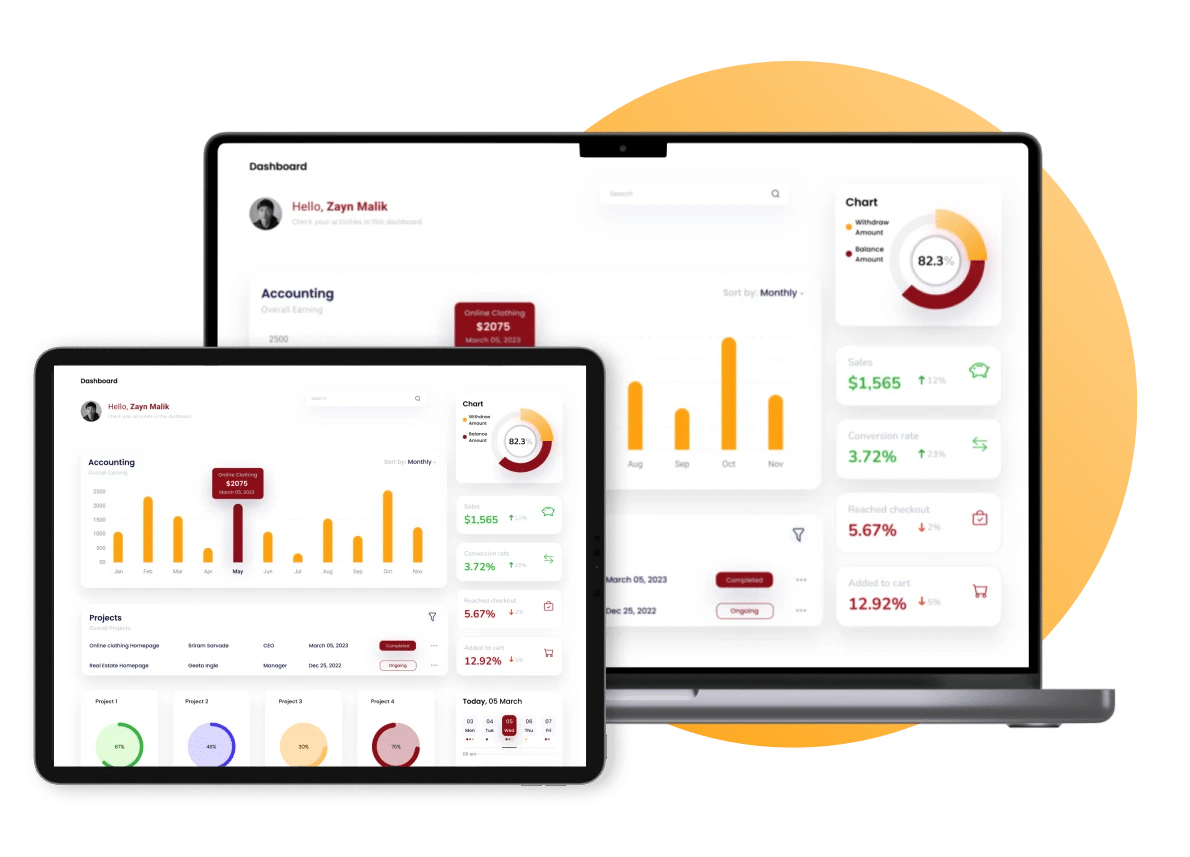The CRM system highlights the challenges of maintaining an organization in a fast-paced business environment. Business professionals often find themselves interrupted by phone calls or emails, diverting their focus from current tasks.
Statistically, companies are expected to manage hundreds or even thousands of leads and monitor their sales team activities to devise the best business strategies. The volume of immediate inquiries can be overwhelming for businesses operating both online and offline stores.
Managing a to-do list, maintaining communication with leads and customers, handling key contacts, and completing tasks can seem more like a burdensome obligation than an engaging work activity. This is the scenario where Customer Relationship Management (CRM) systems prove invaluable.
This article will explore everything from a CRM system’s basic definitions and purposes to the array of tools available for effective customer relationship management. Whether you are the owner of a hybrid store, part of a growing company seeking to enhance CRM efficacy, or a sales manager, prepare to dive into the intriguing world of CRM and discover its transformative potential for your organization.
Key Takeaways
|
Table of Content
Content Lists

What is a CRM System?
Customer Relationship Management (CRM) is a system that helps businesses manage customer interactions and relationships effectively. As technology advances and competition grows, adopting a strong CRM system has become essential for success.
One key aspect of understanding CRM systems is recognizing that they are not just tools for customer relationship management but also business growth and success. Companies can streamline operations and improve efficiency by centralizing customer data and automating various tasks.
Moreover, CRM systems can also help identify potential sales opportunities, target specific customer segments, and optimize marketing campaigns.
In short, a CRM system gives businesses an in-depth view of their consumers and offers them the tools they need to optimize many of their operations, such as sales and marketing, customer service, and support.
With growing market rivalry, a strong CRM system is a key difference that may help companies survive in today’s fast-paced economy. So, if you haven’t already established a CRM system, now is the time to bring your company to the next level.
What Value Can CRM Add to Your Business in the Philippines?
One study discovered that implementing a CRM system increased the revenue generated by each salesperson by 41%. Furthermore, 41% of companies reported increased revenue per salesperson after deploying a CRM system. In the Philippines, the adoption of CRM systems has been rising for good reason. By integrating CRM, companies can enhance their performance and revenue.
Moreover, CRM systems are crucial for promoting customer retention and loyalty—an essential factor in today’s competitive market. These systems allow companies to anticipate client needs, tailor their services, and engage with customers more effectively. Companies that utilize precise sales forecasts and analytics within a CRM system can make informed decisions that align with their business goals and customer expectations.
In essence, a CRM system integrates vital information into the art of conducting business, making it indispensable for companies in the Philippines striving to thrive in the digital era. This technology optimizes customer interactions and strengthens overall business strategies, reinforcing the company’s position in an increasingly competitive market.
Who Needs a CRM System in Their Business?

After learning the definition of CRM, you may recognize that a CRM system has become an integral part of modern businesses. But who needs a CRM system in their business?
A CRM tool makes your workflow more efficient. Replying to dozens of inquiries, creating promotional messages, and keeping in touch with prospects and customers is hard work. This situation is common in growing or enterprise-level companies, so CRM systems are more optimally used at that company level.
Types of CRM
Understanding the types of CRM systems can help businesses optimize their customer relationship management processes. Each CRM software type serves a specific purpose to improve customer experiences and support business goals.
- Operational CRM: This type of CRM system focuses on automating day-to-day sales, marketing, and customer service tasks. By streamlining workflows, it helps businesses save time and enhance customer interactions.
- Analytical CRM: Analytical CRM software collects and analyzes customer data to provide actionable insights. These insights help businesses make data-driven decisions to improve customer experiences and drive sales.
- Collaborative CRM: Collaborative CRMs are designed to improve communication and teamwork across different departments. They ensure sales, marketing, and support teams work together seamlessly to deliver a unified customer experience.
- Strategic CRM: This type of customer relationship management focuses on long-term planning to build and maintain strong customer relationships. It aligns business strategies with customer needs to drive loyalty and growth.
Choosing the right CRM system for your business can enhance customer relationships, streamline operations, and boost efficiency. Whether you’re exploring what is a CRM system or seeking specific features, these types offer tailored solutions for your needs.
Key Features to Look for in a CRM System
A CRM system includes several crucial components vital for optimal performance. These features form the core functionalities of any CRM system, making it an essential tool for businesses that aspire to cultivate robust customer relationships and promote growth. Such features include:
- Contact Management: This feature stores contact information such as name, address, and social media accounts in a searchable database.
- Interaction Tracking: Add notes and track interaction history to document conversations with specific leads.
- Lead Management: Manage leads and sales opportunities, track information, and set the next activities.
- Email Integration: Integrate the system with email for efficient communication.
- Quotation/Proposal Management: Create and track the status of quotes or proposals for customers.
- Sales Pipeline Management: Manage and visualize sales stages and the following actions.
- Workflow Automation: Automate sales tasks and processes for efficiency.
Before knowing more about the features of the CRM system, you can start considering the price calculation of HashMicro CRM software by clicking the banner below.
In addition, good and advanced CRM software also provides features to promote efficiency during the sales process, such as:
- GPS Sales Tracking: This feature enables the monitoring of each sales team member’s progress and performance, facilitates the distribution of appropriate tasks, and allows for notifications regarding team achievements. A specialized retail CRM software is usually used by those who run a retail store.
- Chatroom: This function provides a platform for real-time and integrated communication within teams, enhancing collaboration and information flow.
- CRM Mobile Applications: This application, which is free for both iOS and Android, simplifies access to CRM tools from any location.
- Leads: In a robust CRM system, leads—individuals likely to become regular customers—are scored based on accurate data to enhance customer acquisition strategies and foster loyalty.
- KPI for Activity Targeting: This metric assesses the effectiveness of customer relationship management and team performance, offering insights into business prospects and operational cycles.
- Integration: This system should be able to integrate with other modules, such as BIR eSales (for tax and sales data submission), accounting, inventory, and purchasing.
These features are essential for improving work quality through better monitoring. Successful businessmen, including you in the Philippines, can track the performance of your employees thoroughly.
Based on the explanation above, CRM is intended to elevate business to a higher, more professional level. A CRM system ensures that each interaction is an opportunity to deepen relationships and promote growth. As a result, the principal value of a CRM system is its ability to bring the company closer to customers, promote loyalty, and build long-term commercial connections.
AI in CRM
Integrating AI into CRM systems transforms how businesses manage customer relationships. AI-powered tools enhance CRM software by providing deeper insights into customer behavior, preferences, and needs, enabling personalized and effective interactions.
The evolution of customer relationship management reflects the shift toward customer-centric strategies. While traditional CRM systems began as simple databases, they now incorporate advanced features like automated ticket routing, intelligent notifications, and AI-driven insights to meet rising customer expectations.
Today, businesses can leverage AI-powered CRM tools from providers like Salesforce CRM (Einstein GPT) and Zoho CRM (Zia). These solutions offer innovations such as actionable meeting summaries and custom email templates, empowering businesses to deliver real-time, personalized experiences that foster stronger customer relationships.
Benefit of CRM
A CRM system provides numerous business advantages by enhancing organization, productivity, and customer satisfaction. Here are eleven key benefits of customer relationship management software:
- Boosted Productivity for Sales Teams: A CRM system organizes customer data, helping sales teams prioritize leads and close deals faster. With centralized access to customer interactions, teams can efficiently track and manage the sales process.
- Unified View of the Customer: CRM software consolidates customer data from various channels into a single, accessible view. This unified approach enables personalized experiences and informed decision-making across departments.
- Actionable Analytics and Dashboards: CRM systems offer customizable dashboards to analyze customer behaviours, sales trends, and marketing performance. These insights enable businesses to adapt strategies for better outcomes.
- Automated Customer-Centric Workflows: CRM software automations streamline repetitive tasks like sending follow-up emails or logging interactions. This allows teams to focus on creating personalized, customer-focused outreach efforts.
- Proactive Customer Service: With detailed customer histories, CRMs empower service agents to anticipate needs and resolve issues quickly. Automation tools like chatbots further enhance service efficiency and customer satisfaction.
- Simplified Team Collaboration: CRM systems are a shared resource for all team members, ensuring access to up-to-date customer information. Features like collaborative notes and integrated communication tools improve teamwork.
- Enhanced Productivity with AI: AI-driven CRMs provide predictive insights, like identifying high-potential leads or anticipating service issues. These tools speed up decision-making and enhance overall efficiency.
- Integration with Existing Tools: CRM software integrates seamlessly with apps like ERP, marketing tools, and supply chain systems. This ensures smooth workflows and better customer interactions across platforms.
- Anywhere, Anytime Access: Cloud-based CRM systems allow teams to access data from any location or device. This flexibility supports remote work and real-time updates for enhanced collaboration.
- Scalability for Business Growth: CRMs grow with your business, offering the flexibility to add features or users as needed. This scalability ensures your CRM system adapts to evolving business needs.
- Reliable Data Security: Modern CRMs prioritize data protection, safeguarding sensitive customer information. Built-in security features ensure compliance and trust, which are essential for customer-centric businesses.
Investing in the right CRM system transforms how businesses manage customer relationships. By leveraging these benefits, companies can drive growth, improve efficiency, and deliver exceptional customer experiences.
How to Choose the Right CRM System for Your Business?
Choosing the best CRM software for your business in the Philippines requires careful consideration of your company’s unique demands and goals. For businesses with a loyalty program, it’s essential to select a CRM that offers tools to build lasting customer relationships through personalized rewards and engagement strategies.
Here’s a quick guide to help you make an informed decision:
1. Identify your business goals
Determine what you want to accomplish with a CRM system. This could involve enhancing client relationships, boosting sales, or streamlining communication. Think about your company’s size, the complexity of your sales cycle, and the level of client involvement. This will help you identify the characteristics you require.
2. Review the features and tools
Look for key features such as salespeople management, interaction tracking, lead management, and reporting. Consider the ease of use and customization choices. Check if the CRM integrates with your existing tools and software, such as inventory, human resource, and accounting software. This can save you time and reduce complexity.
3. Try free demo or free trials
Some CRM system providers offer free trials. You can take advantage of this before purchasing their product. Through the trial, you will get to know the system’s user experience and explore more about the features that can support your company’s needs.
By following these steps, you may limit your options and choose a CRM system that will efficiently serve your organization while growing with you over time. But do you know that there is a system that provides all of these critical features of CRM with more benefits?
Yes, there is a one-solution system that will help you expand your business with just your phone or laptop. Want to know more? Read this section below carefully, and you’ll receive a gift for your company.
HashMicro as the Best Solution for Your Business

Known for its efficiency and innovative approach, HashMicro excels in customer relationship management (CRM). Its straightforward and powerful tools make it the ideal choice for businesses looking to improve their sales processes.
HashMicro’s CRM system does more than just manage contacts; it strengthens relationships that lead to business growth and success. The system simplifies the sales process by automating tasks, making it easy to turn potential leads into loyal customers.
Designed to meet specific business needs, the HashMicro CRM offers additional features that enhance its functionality, such as:
-
Sales pipeline
Leads are moved from one stage to another based on their sales status. The sales pipeline can be customized according to individual preferences.
-
Sales team management
Monitor sales progress and each salesperson’s performance. Assign appropriate tasks and receive notifications regarding sales representatives’ achievements.
-
Revenue forecasting
Accurately forecast revenue from each lead and effortlessly compile a list of prioritized prospects.
-
Email marketing management
Create, customize, and send pertinent emails to segmented subscribers, customers, or leads. Respond directly to emails through the system.
-
Call logging management
Every conversation with each prospect is meticulously logged to assist sales representatives in understanding leads better and optimizing customer service.
-
Sales report management
The system generates real-time sales reports, which cover sales activities, team performance, profits, and losses, among other metrics.
These CRM system benefits are exclusive to HashMicro. Opting for HashMicro signifies choosing a path to success supported by a CRM system that recognizes the importance of each client. As part of its support for your business, HashMicro provides a free demo.
The CRM system is available for a trial at no cost and with convenience. You can also connect with our expert team through the chat feature on this page to learn more about HashMicro’s features.
Conclusion
Customer Relationship Management (CRM) is a pivotal technology tailored to enhance a company’s interactions with its existing and prospective customers. An effective CRM system is crucial for nurturing business growth by optimizing customer relationships.
A comprehensive CRM system encompasses various essential components and tools. Despite numerous software options, only some provide a complete CRM solution. In contrast, HashMicro is a premier CRM provider in Southeast Asia.
It invites businesses to explore its offerings through a free demo. Companies in the Philippines are encouraged to seize this opportunity or connect with HashMicro to learn about systems that can significantly improve their operational efficiency.
FAQ About CRM
-
What is the CRM tool used for?
A CRM tool is used to manage and improve customer relationships by organizing interactions, tracking customer data, and automating tasks. It helps businesses streamline sales, marketing, and customer service processes for better efficiency and customer satisfaction.
-
What is the purpose of a CRM?
The purpose of a CRM system is to centralize customer information, enhance communication, and build stronger customer relationships. It enables businesses to deliver personalized experiences, improve retention, and drive sales growth.
-
What are the benefits of CRM?
A CRM system offers benefits like improved productivity, actionable insights through data analysis, and enhanced customer service. It also supports better collaboration across teams, streamlines workflows, and provides scalability for business growth.






































